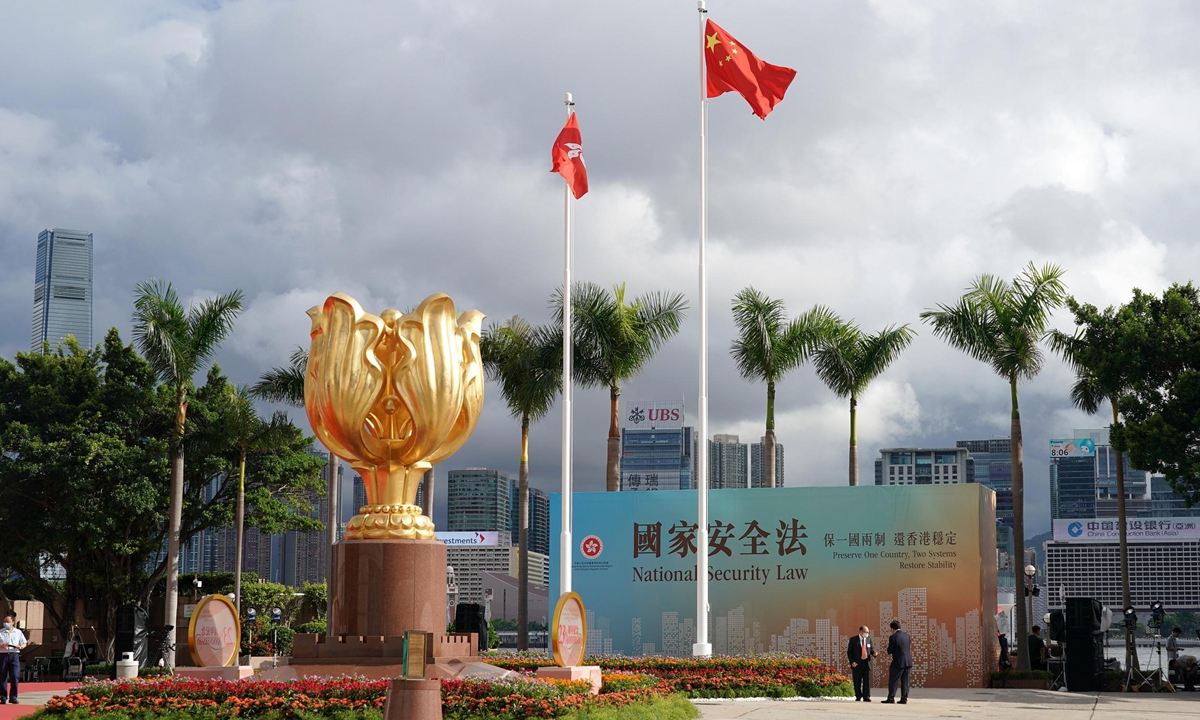Local group in Hong Kong disbanded for disseminating ideas of 'Hong Kong independence'

Photo: VCG
A local organization that was set up to promote Cantonese in Hong Kong was disbanded on Monday after the Hong Kong Police Force's national security department visited the family residence of the group's organizeron August 22. Experts said the organization ostensibly claimed to promote Cantonese but in reality, subtly disseminated ideas linked to "Hong Kong independence," creating controversial factors that could impact social order.
Andrew Chan Lok-hang, chairman of Societas Linguistica Hongkongensis, was quoted as saying in media reports in Hong Kong that the national security department officers arrived at his former home on August 22, seeking to meet with him. But Chan was not in Hong Kong and the officers requested his family convey to him the need to "take down and delete an essay submitted to a Cantonese contest" three years ago.
"Considering the safety of my family and former members, and the lack of staff to continue operations, I decided to stop operating the organization and initiate the dissolution process," Chan said.
Chan, who was studying in the Chinese Medicine Department of Hong Kong Baptist University, founded Societas Linguistica Hongkongensis, local media Wei Wen Po reported. Although it claimed its aim was to "promote Cantonese," its actions revealed a radical localist nature, deliberately distinguishing Hong Kong from the Chinese mainland, the report said.
After its establishment, the organization frequently collaborated with various opposition groups, vehemently opposing the Hong Kong Special Administrative Region government's bilingual education policy promoted in primary and secondary schools. And it was seen by the public as a group that disseminates separatist ideas.
In recent years, the organization rarely held public events. Chan did not specify which article the national security department asked him to remove. However, according to local media reports, before the implementation of the National Security Law for Hong Kong, the organization received a grant of HK$20,000 from the Central and Western District Council through the community participation funding scheme to organize a Cantonese essay contest.
Hong Kong lawmaker Elizabeth Quat later held a press conference lashing out at the contest as being radically anti-China and claimed the District Council was funneling interests to them. She believed that the activity might constitute misconduct in public office and reported the matter to the Independent Commission Against Corruption and the Home Affairs Department, according to media reports.
The territory's Home Affairs Department earlier criticized its works as containing "vulgar language and controversial, misleading, and disruptive elements that may affect community harmony." The department requested that the organization obtain written consent from the Hong Kong government before publishing or making any public release, the report noted.
"The organization focused on the diminished usage of Putonghua and proper expression of spoken and written Chinese. It also highlighted political involvement and engagement instead of cultural development and cultivation. The disbanding of the organization is within the community's expectation," Chu Kar-kin, a veteran current affairs commentator based in Hong Kong and member of the Chinese Association of Hong Kong and Macao Studies, told the Global Times on Tuesday.
Languages including local dialects are tools for communication but not for hostile classification or discrimination. Some rude and inappropriate language was adopted in the previous events hosted by the organization, Chu said. "Conservation of the practices of Cantonese dialect should not be used to spread hatred or uncomfortable feelings in the community. Unity but not separatism or isolation should be the key for inheriting of language and dialect," he added.
Advancing the school education in Putonghua is very important as Hong Kong's youths would be at a disadvantage if they could not speak Putonghua, the common language used nationwide in China, and if some conditions can be met, local schools in Hong Kong should offer education in Putonghua, Christine Choi Yuk-lin, secretary for education of the Hong Kong Special Administrative Region, told the Global Times in an earlier interview.
Some experts believed that the investigation launched by the Hong Kong police's national security department into Chan is based on substantial evidence.
"Chan's decision to initiate the dissolution process is likely out of concern for implicating his family members," Willy Fu, a law professor and vice-chairman of the Hong Kong Legal Exchange Foundation, told the Global Times on Tuesday.
Even if Societas Linguistica Hongkongensis is dissolved, law enforcement can still legally hold the founders criminally responsible, and trace and arrest associated criminals, Fu said, who urged Chan to return to Hong Kong and turn himself in. "Otherwise, he will be wanted by the police, bear the stigma of a fugitive, and live in exile, separated from his family in Hong Kong for life."

